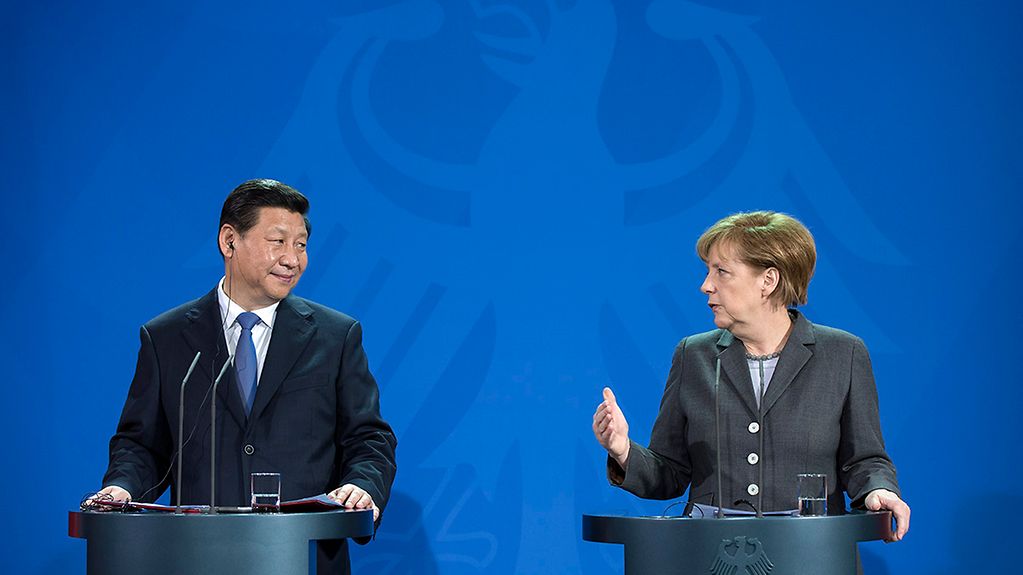Germany/China
Germany and China have agreed on an extensive strategic partnership. During his visit to Berlin, Chinese President Xi Jinping and Chancellor Angela Merkel agreed that their two countries would cooperate more closely in the fields of business, research, financial policy and foreign policy.
3 min reading time

It was Xi Jinping's first official visit to Germany as Chinese President
Photo: Bundesregierung/Bergmann
In a joint statement, the two leaders said, "Germany and China see themselves as long-term strategic partners and have built mutual political trust."
The strategic partnership has already been in place for some years, said Chancellor Angela Merkel after her meeting with President Xi Jinping. It is, however, to be consistently expanded. The foreign ministers of the two countries, for instance, will elaborate an action programme for the government consultations scheduled for this autumn, so as to step up cooperation "in new fields".
During the meeting at the Federal Chancellery, representatives of German and Chinese businesses signed numerous cooperation agreements.
2015 – the year of cooperation on innovation
Angela Merkel and Xi Jinping agreed to forge ahead with development in the fields of "industry 4.0" (smart factories), energy supplies and research.
The Chancellor said that she was happy to accept the proposal of the Chinese President to make 2015 the year of cooperation on innovation between Germany and China. "One possibility would be for us to invite China to be the partner country of CeBIT 2015."
The two states also want to step up exchange in the university, tourism and youth sectors, "so that the two countries and the people of these two countries get to know one another better," as the Chancellor put it.
Investment agreement between the EU and China
Germany will do what it can to bring the investment agreement between the EU and China to a swift conclusion, continued Angela Merkel. This could be "the precursor for a free trade agreement in future".
The Chancellor thanked China, because it never questioned confidence in the euro throughout the euro crisis. "I believe this to be very important," she said. Germany will "be providing extremely constructive support in Frankfurt in particular with respect to cooperation with renminbi, the Chinese currency, as well as with further developments".
Resolving international conflicts
The Chancellor and the President also discussed foreign policy matters. Angela Merkel brought up the issue of stability on the Korean peninsula and the negotiations on Iran’s nuclear programme.
The situation in Ukraine was also on the agenda. Angela Merkel and Xi Jinping called for a political and diplomatic solution. The President said that the current situation in Ukraine is the result of "an extremely complex historical background". The Chinese side always upholds the fundamental principle of international relations, he added. It does not intervene in the internal matters of other states and it respects the sovereignty and territorial integrity of all countries.
In the joint statement, Germany and China announced their agreement on closer cooperation in resolving international conflicts. They also aim to "step up engagement to resolve regional and global conflicts". The two sides agreed to increase bilateral exchange on the situation in Ukraine, Afghanistan, Syria, Iran and on the Korean peninsula.
Human rights dialogue
Angela Merkel underlined the fact that she had also discussed the human rights dialogue with Xi Jinping. She had made it clear that freedom of expression is a vitally important element in fostering the creativity of a society – in research, as in culture and civil society.
The Federal Republic of Germany and the People’s Republic of China established diplomatic relations in 1972. Since then they have stepped up cooperation in many areas. The two countries are mutually dependent in economic terms. China is Germany’s largest trading partner in Asia, while Germany is China’s main European trading partner.
In the fields of science and technology and in the education sector, cooperation between the two countries has also developed consistently over the last thirty years or more. Germany and China work together as equal partners.
The building of an "ecological civilisation" is a guiding vision of President Xi Jinping, while Germany is placing its faith in renewable energies for the future. The two countries thus have common ground in the field of environmental protection.
In spite of common ground though, and the generally positive development of bilateral relations, fundamental differences of opinion still exist in Germany and China with respect to human rights.